For these past few weeks, I’ve been floating in a fog of funerals and farewells from which I’m not quite ready to emerge. Trying to have some rest and restoration this weekend, so I’ll be able to focus on work again on Monday (there’s a research funding bid to write, for starters), I find myself thrown back into the mist every time I try to look into the sun. There are still more stories to tell.
Completing this series of blogs, there is Michelle‘s farewell, and then Michelle’s life to tell you about (I’ll share her eulogy tomorrow).
There may well be postscripts, too. I’ve learned more about life, death and intellectual disability in these past few weeks than I’ve learned in the past few years of research.
Michelle’s funeral was an exuberant, sad, uplifting, publicly intimate affair.
It had something of the home-spun about it. We did it ourselves, said Michelle’s friend Louise, with whom I carried Michelle’s coffin into church. It was a different church from the one where Carol’s funeral was held five days earlier, but here, too, there was standing room only. We sang our hearts out.
Michelle’s friends were many and spanned a lifetime.
Her oldest friend Janet (that’s not her real name) had shared Michelle’s life since they were both little girls. They grew up together in hospital, like sisters. So inseparable, in fact, that it was blindingly obvious to everyone (except perhaps the local council who had to fund it) that when Janet came to live in L’Arche London, Michelle had to come too.
Janet herself is now in the winter of her life, the days closing. It is difficult to know how she understood Michelle’s death (can any of us understand it?), but it was deeply moving to see her stand in front of her soulmate’s coffin, sing a song, say an Amen, then walk away with such dignity.
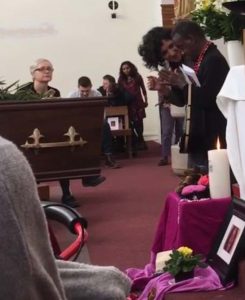
Janet at Michelle’s funeral
Michelle’s good friend from her L’Arche years, holding up a framed photo when we all gathered for Michelle’s “wake”, the evening before the funeral, telling stories, remembering. Remembering the friendship.
She was the best friend I’ll ever have. I’ll miss her.
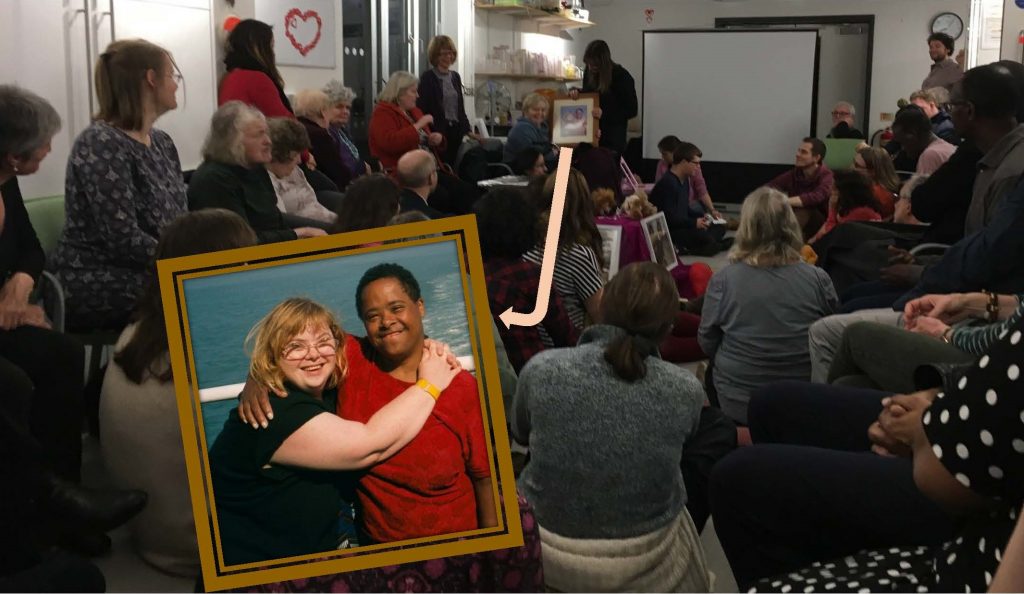
Michelle’s friend shows us her treasured photograph
We weren’t sure whether anyone from Michelle’s family could make it, so we were astonished to see Michelle’s mother turn up unexpectedly early for the wake. Hers had not been an easy story. Like Carol’s family, she had to cope with leaving her small daughter in an institution – and then disappeared from the scene completely. In her L’Arche years, Michelle found “mummy” again, now living thousands of miles away. There were several jet-setting holidays to Canada and the States. Today, mummy is in her eighties and frail. To have made it across the ocean is nothing short of miraculous.
One of the friends missing from that evening of remembering was Colette, who had become so close to Michelle during the last few years in the Care Home.
(Colette’s story clearly struck a chord with you all – the blog post describing the conversation I had with her, the day Michelle died, has been seen almost 25,000 times on Twitter.)
I’d telephoned the Care Home several times, urging them to ensure that staff and residents came to this gathering, if not the funeral.
Even if they don’t want to stay, I explained. That will be fine. People will be wandering in and out, making noises, crying or laughing, it doesn’t matter. Please let Michelle’s friends come. Please let Colette come.
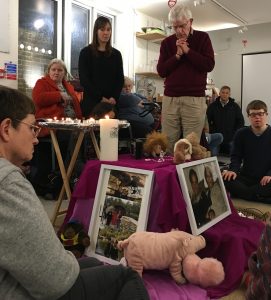
But Colette’s family was there. Her sisters, deeply moved by this messy, heartfelt, tender time of sharing memories and belting out Michelle’s favourite songs (Edelweiss! Michelle Ma Belle! You Are My Sunshine!), agreed. Colette should have been there.
They brought Colette to the funeral to following morning.
The funeral was both well-planned and spontaneous, with space for Colette to come forward with her sister. She gave an impromptu speech, with words that were strikingly similar to those of the friend the night before.
She was the best friend I’ll ever have, Colette said to everyone in the church, having wheeled herself right in front of Michelle’s coffin and facing us all. We do colouring together. She was my best friend. Jesus, look after her for me.
Amen, we said to that.
And then Colette’s sister, after sharing a few of her own memories of Michelle in the Care Home, turned to Michelle’s mother (whom she had met the evening before) and addressed her directly.
Now that I’ve met you, she said, I can see where Michelle gets her beauty from. Thank you for Michelle.
Was this the most moving moment of all these deeply moving days? I think it was.
I know how difficult it is, Colette’s sister said, to make the decision to send your child with disabilities to live somewhere else. I’ve seen how hard it was for my own mother to make that decision. The guilt. But look at all these people here. Look how amazing Michelle’s life has been, and how many people love her. That wouldn’t have happened otherwise. So please don’t feel guilty. Thank you for giving Michelle to us.
Michelle’s mother reached for her hanky. So did I. So did many of us.
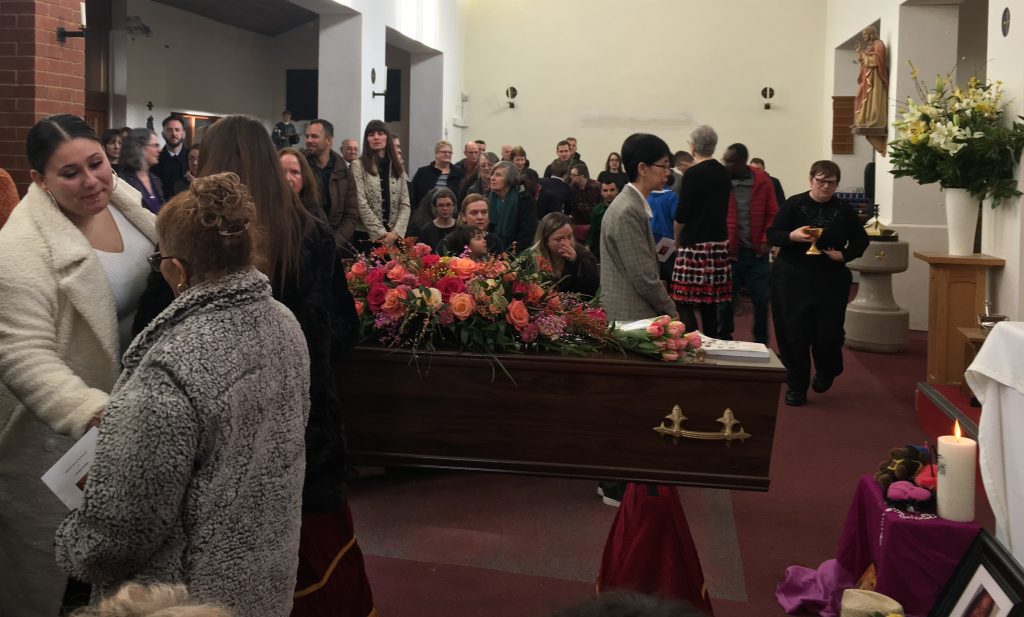
These foggy days of funerals and farewells can (dare I say it) be a time of healing.
If we look death and loss in the face, if we can share our distress, our guilt, our if-only’s, but also our joy at having known and loved this person, if we dare to sit for a while in the new hole in our lives, then that really helps us. It’s helped me. I’ve explored the hole, so now I can recognise it. I’ll still fall into it, but I’ll know how to get out.
(Finding others who know the shape of that hole too. That’s how I get out.)
It has helped me to understand the lives of my two friends, Carol and Michelle, and to see how much sense those lives have made. How they are complete. Seeing that completeness, and indeed seeing how the very heartbreak of their stories are an essential part of the completeness, has also helped me. It is a comfort.
So I’m on a mission. In our recent Talking About Dying Survey, we asked support staff across the UK whether bereaved people with learning disabilities were involved in funerals.
We found that most people with learning disabilities now attend the funeral of someone close to them, but very few participate in them.
Even if it is the funeral of a parent, say. Very few people were involved in planning it, choosing songs or flowers, saying a few words, helping to carry the coffin. Few people with learning disabilities, it seems, are helped to take their place as principal and active mourners.
If you are not convinced that it is possible to include a very diverse group of friends and family in the rituals of farewell, do watch this short video of Michelle’s wake and funeral. Gloriously, it starts with a very short clip of Michelle herself, singing along to Edelweiss. We have been singing it a lot during these past few weeks…

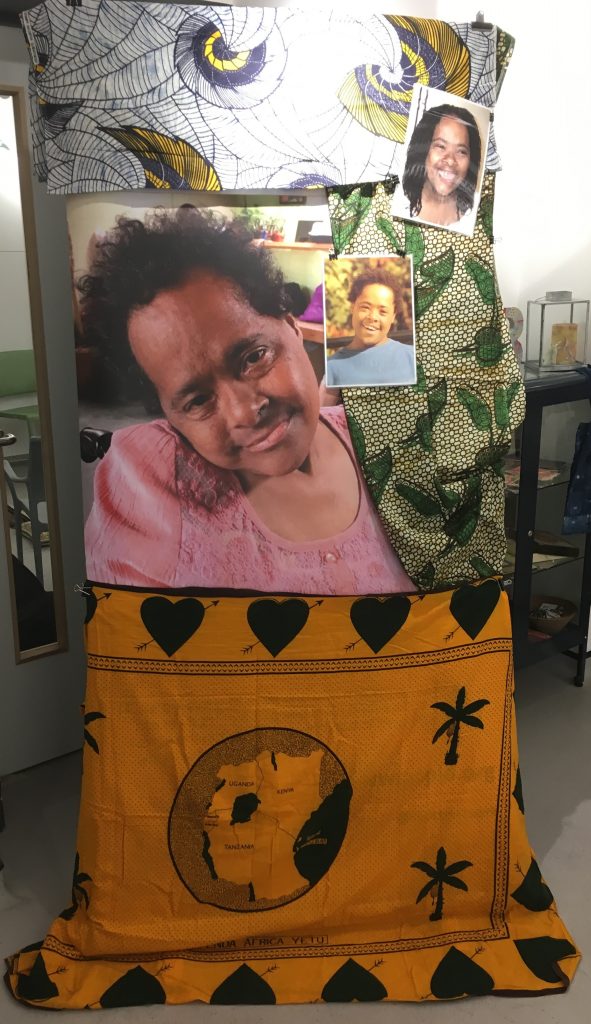
Pingback: The story of Michelle Antia: a eulogy |
Pingback: And now what? – Crossing the bridge into Next
Pingback: L’Arche, Jean Vanier and revelations of abuse: The tasks of mourning |